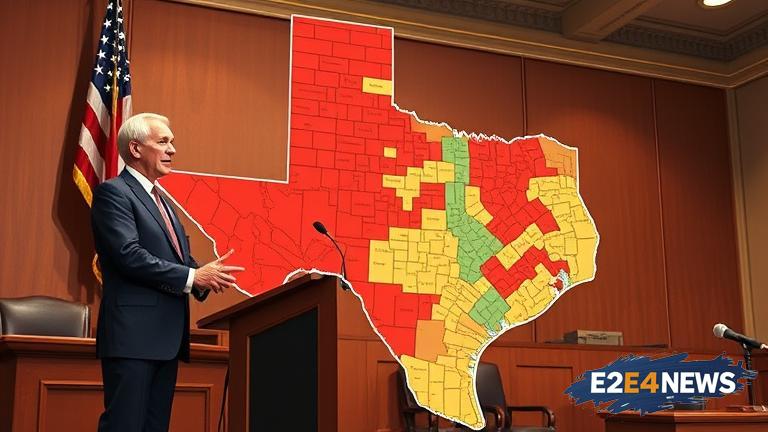Texas House Republicans have recently proposed a new plan for congressional redistricting, which could significantly impact the state’s electoral landscape. The proposal, which was unveiled on Wednesday, aims to redraw the boundaries of the state’s 38 congressional districts. According to the plan, several districts would be reconfigured to favor Republican candidates, potentially giving the party an advantage in future elections. The proposal has been met with criticism from Democratic lawmakers, who argue that it is an attempt to gerrymander the state’s electoral map. Gerrymandering is a practice in which electoral district boundaries are manipulated for political gain. The Texas House Republicans’ proposal is the latest development in the ongoing debate over congressional redistricting in the state. The process of redistricting occurs every 10 years, following the release of new census data. This year, the Texas Legislature is tasked with redrawing the state’s congressional map to reflect changes in the population. The proposed plan would create new districts in areas with growing populations, while also reconfiguring existing districts to better reflect the state’s demographic shifts. However, Democrats have expressed concerns that the plan is designed to dilute the voting power of minority communities. The proposal has also been criticized for splitting counties and cities into multiple districts, which could lead to confusion among voters. Despite these criticisms, the proposal is likely to pass in the Republican-controlled Texas House of Representatives. The plan would then need to be approved by the Texas Senate and signed into law by Governor Greg Abbott. If enacted, the new congressional map would take effect for the 2024 elections. The Texas House Republicans’ proposal is not the only plan on the table, as Democrats have also introduced their own proposal for congressional redistricting. The Democratic plan would create more competitive districts, potentially leading to a more balanced electoral map. However, the Democratic plan is unlikely to pass in the Republican-controlled legislature. The debate over congressional redistricting in Texas is part of a larger national conversation about the role of gerrymandering in American politics. Many argue that gerrymandering is a major contributor to political polarization, as it allows politicians to choose their voters rather than the other way around. Others argue that gerrymandering is a necessary tool for politicians to maintain their power and influence. The issue of gerrymandering has been the subject of several high-profile court cases in recent years, including a landmark Supreme Court decision in 2019. In the decision, the court ruled that federal courts do not have the authority to hear cases involving partisan gerrymandering. The ruling has been seen as a major victory for Republicans, who have been accused of using gerrymandering to maintain their power in state legislatures and Congress. Despite the ruling, many advocates continue to push for reforms aimed at reducing the impact of gerrymandering on American politics. In Texas, the debate over congressional redistricting is likely to continue in the coming weeks and months. As the legislature considers the proposed plan, voters and advocacy groups will be watching closely to see how the process unfolds. The outcome of the debate could have significant implications for the state’s electoral map and the balance of power in Congress. The proposal has also sparked concerns about the potential impact on minority communities, who may see their voting power diluted as a result of the redistricting plan. Additionally, the plan has been criticized for its potential to lead to more partisan gridlock in Congress, as politicians become more entrenched in their respective parties. The Texas House Republicans’ proposal is a complex and multifaceted issue, with many different stakeholders and interest groups involved. As the debate continues, it is likely that new developments and twists will emerge, shaping the final outcome of the proposal. The proposal is also likely to face legal challenges, as opponents argue that it violates the Voting Rights Act and other federal laws. The legal challenges could potentially delay the implementation of the plan, or even lead to its rejection by the courts. Ultimately, the outcome of the debate over congressional redistricting in Texas will depend on a variety of factors, including the actions of lawmakers, the courts, and the public. As the process unfolds, it is essential to stay informed and engaged, as the consequences of the proposal could be far-reaching and profound.
